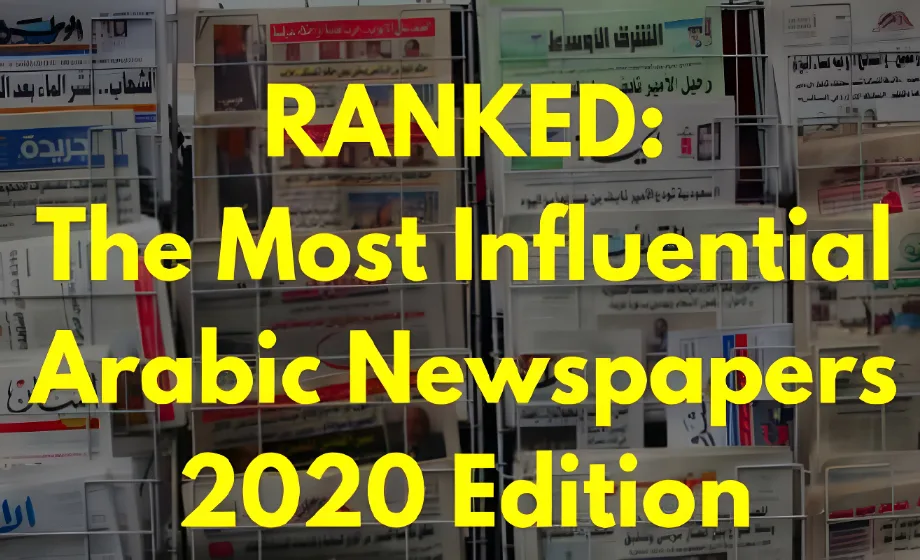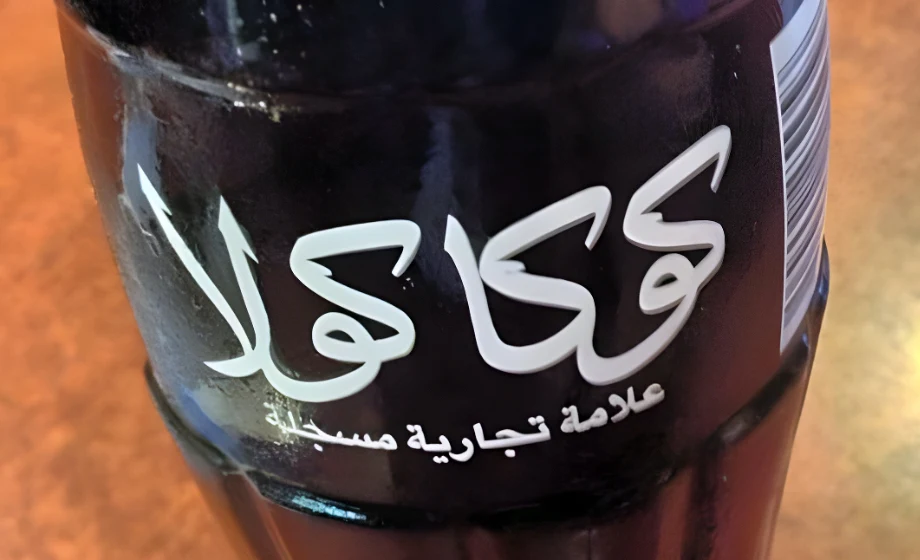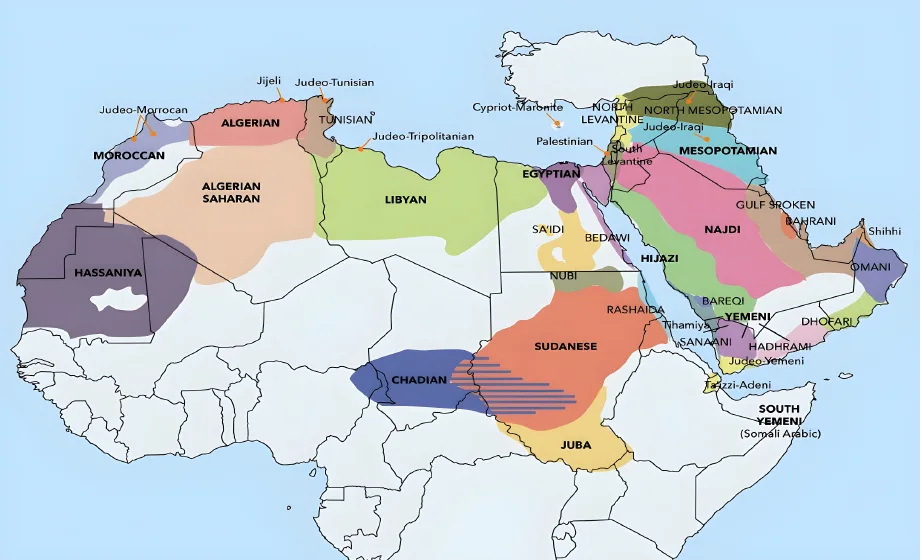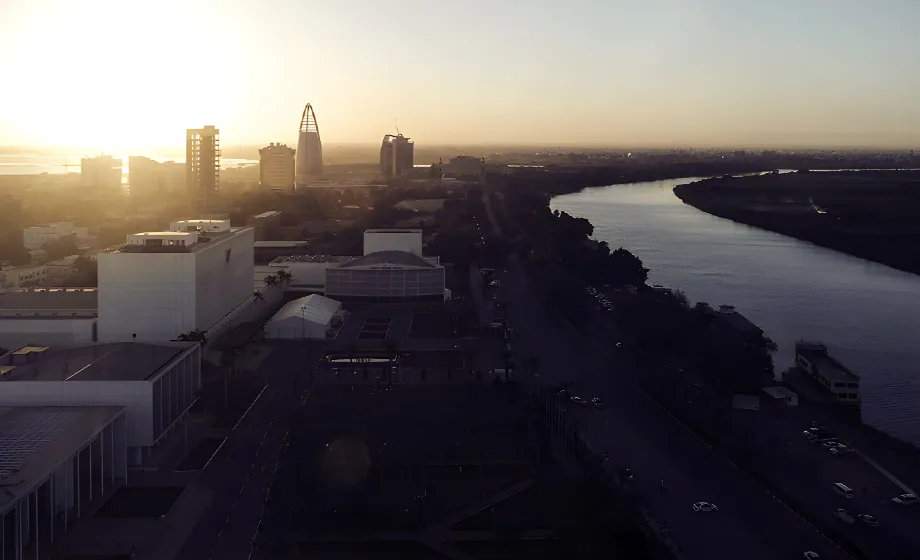With hundreds of Arabic newspapers across the world, both state-backed and independent, it’s harder than ever to choose between outlets. That’s why we’ve compiled this list of the most influential Arabic-language newspapers.
Our methodology combines quantitative measures of a paper’s reach and impact, with qualitative factors to provide an overall influence score. It considers both the overall footprint of the publication, as well as measures of influence. Searchers online are more likely to find higher-ranking papers in a search due to the number of pages on its site, as well as the number of links referencing the papers’ individual web pages.
This list also details the papers’ political affiliation and ownership. Please note that the list is not an endorsement of one certain paper or political stance. Rather, we wanted to provide a transparent index of each paper’s reach and influence. Knowing these facts is essential for understanding the tone of any sort of media.
We revisit the list semi-annually. If you have any feedback on the ranking or process, please contact us here.
To read the 2018 edition of this list, click here (PDF download).
2020 Analysis of Rankings
As seen in our last list, we found three of the region’s most famous Arabic newspapers represented in the Top 10 (Al-Ahram at #10, and An-Nahar and Al-Quds Al-Arabi tied at #7). This is no doubt due to the first two’s historic presence in the Arabic media landscape, and the latter’s influential interviews and stories during the early 2000s. Youm7 maintains its position from last year at #2. We note the same lack of representation from the Maghreb (Morocco, Algeria, Tunisia, Libya) from our list, as was the case last year. It seems that the Levant and Gulf regions continue to dominate the news cycles and media markets in the Arabic language.
Another Jordanian paper, Ad-Dustour, took the top position on our list this year, replacing 2018’s top paper, Al Ghad, which was nowhere to be found on this year’s list. We might explain this fall from grace from the perspective of press freedom (or lack thereof) in much of the MENA region, especially in Jordan. According to Reporters Without Borders, the government routinely executes gag orders on certain media companies that feature unfavorable coverage. The Jordanian government also passed a cyber-crime law in 2015 that imposes jail sentences on internet journalists for social media content that upset the status quo. Thus, papers such as Ad-Dustour and Al Ra’i (#5), both of which hold government-friendly positions, have an easier time promoting their content online with less fear of backlash.
Though many of these papers may have semi-official affiliations with their home governments, or hold pro-government biases, one state-owned paper found its way to the top ten of our list. Akhbar el-Yom/Al Akhbar (#8) is the semi-official media arm of the Egyptian Shura Council, which gives it a privileged position within the country’s media landscape. Egypt has earned a negative reputation when it comes to press freedom in recent years. Many smaller, independent, and oppositional newspapers have witnessed reprisals from the government, including raids, arrests, and forced shutdowns. In this context, one can understand how Al Akhbar managed to rise to the top of our list, and how Youm7 has been able to remain so highly influential. Even though this independent paper can be critical, Youm7 seems to be too big to repress at this point in time. As such, its juggernaut status is just as valuable of an asset as toeing the party line is for other papers.
We also saw two major Qatari papers appear on our list (Al-Watan at #4 and Al Sharq at #6), both of which made huge leaps from their positions on the 2018 list. It may seem strange that two of these papers from a tiny Gulf country occupy higher positions on the list. This is especially the case given the current diplomatic crisis among the GCC due to Qatar’s support for the Muslim Brotherhood. However, Qatar is the home to the Al-Jazeera news network, thus the country is a major player in the Arabic media landscape. Likewise, Brotherhood members can look towards Doha for news and media outlets sympathetic to their positions, which may explain the uptick in traffic towards these two papers.
One surprise to this year’s list was the presence of two English-language newspapers (The Daily Star at #3 and Times of Oman at #9). As English has been one of the world’s de facto universal languages, it is no surprise to find English language papers in the MENA region. However, to see two beating out many other Arabic language papers is notable. What makes these two papers even more extraordinary is that they come from two of the smaller MENA nations, Lebanon and Oman, respectively. However, when viewed in the context of current events and demographic trends, their presence may not be as unusual as we initially thought.
In the case of The Daily Star, their high position could be explained by the recent series of protests that rocked Lebanon in late 2019. The popular protests against the current political and sectarian system of government in Lebanon have led to the resignation of Prime Minister Saad Hariri and call for a new constitution. As the world’s attention focuses on these unfolding events, many from around the world are searching for the latest news in a language they can understand (most likely English). It also helps that The Daily Star is almost completely owned by the former prime minister’s family, which has certainly played a role in its high level of influence on the internet. One must also consider the vast number of Lebanese expatriates and people of Lebanese descent that live abroad who still keep up with the latest news in that country, which most likely had a large impact on The Daily Star’s influence rating as well.
As the death of Sultan Qaboos occurred after we performed our 2020 analysis, we believe that this paper’s influence has more to do with demographics than current events. According to its latest statistics, about 2 million Oman’s residents are expatriates, and most of them hail from the Indian subcontinent. One of Times of Oman’s strengths is that it covers the latest issues and trends in both the Gulf and Indian subcontinent. Thus, this paper’s readership is boosted not only by English speakers in Oman, who want to read about events in their homelands, but also stretches across the Indian Ocean to countries like India, Bangladesh, and Pakistan.
It appears that the most significant factor in a paper’s strong showing on our list has to do with political persuasion as well as demographics. We can see that the smaller, more marginalized countries are well-represented on the list. This is due in part to the recent events that shine the international spotlight on them, as well as the building of a transnational readership that spans the various diaspora movements worldwide. It also seems that more government-adjacent or friendly newspapers tend to fare better in terms of accessibility to their target audience, as they are able to operate without much government interference. Additionally, having a particular bias towards certain political trends can attract readers from other regions where those viewpoints are not welcome (e.g. the Muslim Brotherhood in Egypt).
The List: The Most Influential Arab Papers of 2020
1. Ad-Dustour (الدستور)
Overall Influence Score: 85
Country: Jordan
Language: Arabic
Inception: 1967
Ownership: Jordan Press and Publishing Company/partially state-owned
Political Orientation: Pro-government
Website: http://www.addustour.com/
This famous daily was formed after two Palestinian papers joined forces in exile after relocating to Jordan due to the 1967 Six-Day War. It remained independent until 1986 when the government became a partial shareholder in the paper. This paper also holds the distinction as the first paper in the Middle East to go online, which it did back in 1998.
Being partially owned by the government, Ad-Dustour has an obvious pro-government bias in its reporting. According to the Jordanian Media Credibility Monitor (AKEED), the paper had a fairly consistent anti-Islamist/Muslim Brotherhood bias during the coverage of recent election cycles. However, with its high circulation and online readership, it is no wonder the daily made it to the top of our list.
2. Youm7 (اليوم السابع)
Overall Influence Score: 80
Country: Egypt
Language: Arabic
Inception: 2008
Ownership: Egyptian Journalism, Publishing, and Advertisement
Political Orientation: Reformist/Liberal
Website: https://www.youm7.com/
Maintaining its position from last year’s list, Youm7 is one of the most popular websites in Egypt, especially among Egypt’s young, college-educated population. According to its own site, it is the most visited Egyptian newspaper site in the country. Independent internet research Alexa Internet cites Youm7 as the sixth most visited site in Egypt. Forbes Middle East has also named it “the most effective news website in the Middle East” twice.
The paper has held positions critical of the Muslim Brotherhood and the Freedom and Justice Party. This stance has garnered outrage and calls for a boycott in the midst of the 2011 Egyptian Revolution. As such, the paper is not officially affiliated with any party or ideology. In its own words, Youm7’s main priorities are “producing absolutely credible news and information, in-depth analysis, and transparent data.
3. The Daily Star
Overall Influence Score: 83
Country: Lebanon
Language: English
Inception: 1952
Ownership: The Hariri Family
Political Orientation: Independent/Neutral
Website: http://www.dailystar.com.lb/
The Daily Star started as the English language daily targeting the influx of English-speaking Westerners drawn to the region due to the burgeoning oil boom. After becoming one of the leading English publications in Lebanon, it then expanded its reach to the entire Middle East and Gulf region. This is also in part due to the Lebanese diaspora caused by the outbreak of the 15-year Lebanese Civil War starting in 1975. During this period, The Daily Star had to shut down its operations twice, only to return to its daily publications in 1996.
Despite its resiliency, the paper also faced significant financial hardships in 2009, which caused it to once again halt its operations. In 2010, however, the Hariri family stepped in and became the majority stakeholders in the paper. Having been a primarily independent paper for most of its life, The Daily Star had maintained a more moderate stance and bias as compared to other papers. However, many have noted the papers belated or muted criticism of Saad Hariri’s government in the wake of the widespread protests that erupted across Lebanon in late 2019, which still continue to this day.
4. Al-Watan (الوطن)
Overall Influence Score: 79
Country: Qatar
Language: Arabic
Inception: 1995
Ownership: Dar Al-Watan Printing, Publishing, and Distribution/Hamad bin Jassim Al Thani
Political Orientation: Pro-government
Website: http://www.al-watan.com/
One of the three major newspapers of Qatar, Al-Watan was the first to come into existence after the government lifted its press censorship laws in 1995. Its entry onto the Qatari media scene attracted a significant readership from the nation’s other two papers, especially affecting Al Raya. Its popularity spread with the release of its mobile news app, Al-Watan Bonus, at the end of 2013.
Al-Watan is owned and distributed by Dar Al-Watan, with the former Qatari Foreign Minister and Prime Minister Hamad bin Jassim Al Thani owning half of the paper. Al Thank has been known to heavily invest in tabloids and newspapers, not only in Qatar but also in England. As such, despite being a partially private newspaper, Al-Watan has an openly pro-government stance.
5. Al Ra’i (الرأي)
Overall Influence Score: 75
Country: Jordan
Language: Arabic
Inception: 1971
Ownership: Jordan Press Foundation
Political Orientation: Pro-government
Website: http://alrai.com/
With a circulation of almost 100,000 copies a day, Al Rai is one of the most widespread newspapers in the country. The newspaper, which maintains its 5th-place position from last year, covers local and regional issues, cultural pieces, and political topics. It also has an English-version sister paper, The Jordan Times.
Al Rai was founded by the Jordan Press Foundation, a government-owned company. As such, it is one of the official state newspapers of Jordan. It publishes the views of the Jordanian government on different topics. In addition, all the paper’s chief editors are appointed by the government.
6. Al Sharq (الشرق)
Overall Influence Score: 74
Country: Qatar
Language: Arabic
Inception: 1987
Ownership: Dar Al Sharq (owned by Sheikh Khalid bin Thani Al Thani)
Political Orientation: Pro-government
Website: https://www.al-sharq.com/
The second of Qatar’s three major newspapers mentioned on our list, Al Sharq is the second oldest of the three. Like its other rival papers, Al Sharq highlights the official business of the ruling Al-Thani family, as well as regional and international affairs. This may be due in part to the fact that Sheikh Khalid bin Thani Al Thani, one of the members of the royal family, owns the paper’s publishing company.
As is the trend for Qatari papers, Al Sharq has a pro-government bias. However, it differs slightly from its rival papers in its coverage of the Muslim Brotherhood. Qatar’s support for the Islamic reform movement is a well-known source of contention between it and its GCC neighbors. Surprisingly enough, Al Sharq ran stories in support of El-Sisi’s 2013 coup in Egypt, in direct confrontation with the typically pro-Brotherhood bias found in the other Qatari newspapers.
7. (tie) Al-Quds Al-Arabi (القدس العربي)
Overall Influence Score: 68
Country: Britain
Language: Arabic
Inception: 1989
Ownership: Al-Quds Al-Arabi Publishing and Advertising (Overseas) Ltd
Political Orientation: Pan-Arab/populist
Website: http://www.alquds.co.uk/
Climbing from its position in the 2018 list, Al-Quds Al-Arabi is another popular ex-pat newspaper based in London. Founded by exiled Palestinians, the paper carries a more pronounced populist slant in its coverage of Pan-Arab affairs. As such, the paper has published content that is critical of Western and Israeli policies.
The paper is proud of its independent ownership. Its first editor, Abdel Bari Atwan, gained notoriety for interviewing Osama bin Laden. Al-Quds Al-Arabi was the first paper to publish his fatwas, although the paper rejects Al-Qaeda and its tactics. Many criticize the paper for taking hard anti-imperialist (often anti-Israel) positions in comparison to other sites.
7. (tie) An-Nahar (النهار)
Overall Influence Score: 68
Country: Lebanon
Language: Arabic
Inception: 1933
Ownership: Private
Political Orientation: Pluralist/Center-left
Website: https://www.annahar.com/
Dropping from last year’s position, An-Nahar is still one of the five most popular newspapers in Beirut according to Ipsos Stat. The influential Tueni family founded and led the paper over the course of its history. An-Nahar has also employed some of the most famous Lebanese authors and political personalities, such as Elias Khoury, Samir Kassir, and Walid Jumblatt.
Many regard the paper as a platform for a wide range of political voices from around Lebanon. In light of this diversity, however, An-Nahar has a definite liberal, anti-Syrian bias, as expressed in the March 14 Coalition. This has led to the paper’s occupation by Syrian forces and banning at various times during its existence. Despite its independent ownership, Saudi media magnate Prince Al-Walid bin Talal also owns a large share in the newspaper.
8. Akhbar el-Yom (أخبار اليوم)/Al Akhbar (الأخبار)
Overall Influence Score: 67
Country: Egypt
Language: Arabic
Inception: 1944
Ownership: Shura Council-owned/semi-official
Political Orientation: Pro-government
Website: https://akhbarelyom.com/
Home to legendary Egyptian novelists Gamal El-Ghitani and Anis Mansour, the Al Akhbar daily newspaper and its weekly counterpart Akhbar el-Yom is the second largest newsprint operation in Egypt behind Al Ahram. The paper is owned by the Shura Council (the Egyptian equivalent to the Senate) and holds a generally pro-government bias. Though semi-official in nature, editors and reporters have been fired for any sort of critical coverage, especially during the short-lived Morsi regime.
In the era of El-Sisi, the paper has avoided the overt media crackdown that other independent Egyptian papers have experienced in recent years. The current regime has made a habit of silencing any oppositional media in whatever form, imprisoning journalists and confiscating their papers in the process. According to Reporters Without Borders, each time the government confiscates one of these papers, such as Al Mesryoon or Daily News Egypt, Akhbar el-Yom is usually put in charge of managing the papers and changing their editorial practices. This may account for Al Akhbar’s higher position on our list than the older, more-established Al Ahram.
9. Times of Oman
Overall Influence Score: 66
Country: Oman
Language: English
Inception: 1975
Ownership: Muscat Media Group
Political Orientation: Independent
Website: http://timesofoman.com/
One of Oman’s oldest English language papers, the Times of Oman enjoys a wide readership within the country and abroad. Following the example of other papers, like Ad-Dustour, the Times also went digital early in 1998. Its web presence and readership are significant; according to its own estimations, over 2 million people visit the site per month.
Like other English-language media, the Times of Oman originally targeted ex-pats from the West working in the Gulf’s oil industry. However, due to the Indian diaspora within Oman and the Gulf in general, the paper has shifted its focus to accommodate this ever-growing market. As such, the paper often runs stories that cover current events occurring on the Indian subcontinent, as well as Indian pop culture.
10. Al-Ahram (الأهرام)
Overall Influence Score: 63
Country: Egypt
Language: Arabic
Inception: 1875
Ownership: Al-Ahram Publishing House
Political Orientation: Pro-government
Website: http://www.ahram.org.eg/
The home newspaper of such famed writers as Naguib Mahfouz, Edward Said, and Taha Hussein, Al-Ahram is an Egyptian media institution. It is also Egypt’s second oldest newspaper. Forbes Middle East named it the most popular news portal in 2011, as well as the 20th most visited MENA site in 2010. With a peak daily circulation of 1.2 million copies in 2000, the newspaper holds significant influence both in print and online.
Founded as an independent newspaper, President Gamal Abdel Nasser nationalized the paper. It is now owned by the Egyptian government via the Al-Ahram Publishing House. Thus, the paper tends to support the prevailing Egyptian regime. Despite the fall from its position on last year’s list, the paper is still one of the most respected throughout the Arab World as a professional and informed news resource.
Places 11-20
11. Al-Araby Al-Jadeed (العربي الجديد)
Overall Influence Score: 62
Country: Qatar
Language: Arabic
Inception: 2014
Ownership: Fadaat Media Ltd.
Political Orientation: Pan-Arab/Anti-Muslim Brotherhood
Website: https://www.alaraby.co.uk/portal
12. Gulf Times
Overall Influence Score: 62
Country: Qatar
Language: English
Inception: 1978
Ownership: Gulf Publishing and Printing Company
Political Orientation: Pro-government
Website: http://www.gulf-times.com/
13. The National
Overall Influence Score: 61
Country: UAE
Language: English
Inception: 2008
Ownership: International Media Investments
Political Orientation: Pro-government
Website: https://www.gulf-times.com/
14. Asharq Al-Awsat
Overall Influence Score: 61
Country: Britain
Language: Arabic and English
Inception:
Ownership: Privately owned by the Saudi royal family
Political Orientation: Pro-Saudi government
Website: https://aawsat.com/
15. Al-Anba (الأنباء)
Overall Influence Score: 59
Country: Kuwait
Language: Arabic
Inception: 1976
Ownership: Bab Al-Kuwait Press Co.
Political Orientation: Pro-government
Website: https://www.alanba.com.kw/
16. Okaz (عكاظ)
Overall Influence Score: 59
Country: Saudi Arabia
Language: Arabic
Inception: 1960
Ownership: Okaz Organization for Press and Publication
Political Orientation: Liberal/Close ties with Prince Nayef
Website: https://www.okaz.com.sa/
17. Al Riyadh (الرياض)
Overall Influence Score: 58
Country: Saudi Arabia
Language: Arabic
Inception: 1965
Ownership: Al Yamamah Press Establishment
Political Orientation: Pro-government
Website: https://www.alriyadh.com/
18. El Fagr (الفجر)
Overall Influence Score: 58
Country: Egypt
Language: Arabic
Inception: 2005
Ownership: Al-Fagr for Printing and Publishing Inc.
Political Orientation: Sensationalist
Website: https://www.elfagr.com/
19. Al-Masry Al-Youm (المصري اليوم)
Overall Influence Score: 58
Country: Egypt
Language: Arabic
Inception: 2004
Ownership: Al-Masry Al-Youm for Journalism and Publication
Political Orientation: Independent/Reformist/Liberal
Website: https://www.almasryalyoum.com/
20. Ad-Dustour (الدستور)
Overall Influence Score: 58
Country: Egypt
Language: Arabic
Inception: 1995
Ownership: Privately owned/Essam Fahmy Ismail
Political Orientation: Opposition/Pro-Muslim Brotherhood
Website: https://www.addustour.com/



